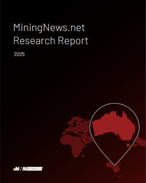This article is 3 years old. Images might not display.
Alkane Resources had been working on the large Dubbo zirconium project in New South Wales for more than 25 years, with cashflow from its Tomingley gold operations allowing the company to continue to move the project forward even in a weak market for rare earths.
It was after Alkane shares surged in September 2019 on the Boda gold-copper porphyry discovery in NSW that the company felt it was the right time to split the gold and rare earths businesses.
Alkane formally announced the demerger in May 2020 after appointing David Woodall as managing director.
An overwhelming 99.95% of Alkane shareholders voted in favour of the demerger in mid-July 2020, which took place via a distribution to Alkane shareholders of one ASM share for every five Alkane shares held.
ASM listed on July 30, 2020 with A$20 million cash and no debt.
Alkane did not retain a stake in the company, though directors Ian Gandel, Nic Earner and Ian Chalmers sit on the ASM board.
On its first day of trade, the stock opened at $1.25 and rose as high as $1.55, before closing at $1.40.
The stock dipped in early August to 84c but since then, has been on an upward trajectory.
On June 30, the stock hit a high of $7.91.
Even at Friday's closing price of $7.15, returns since listing are well over 400%.
At that price, the company has market capitalisation of about $1 billion - significantly higher than Alkane's Friday market cap of $666.8 million.
Still, since the day Alkane announced the demerger (May 20, 2020), the combined market caps of the two companies was up about 300%.
ASM's success hasn't just been about rising sentiment in the rare earths market. The company has also been busy, with steady news flow since its listing day.
In September 2020, ASM acquired 95% of its South Korean joint venture partner Ziron Technology Corporation (Ziron Tech) and a newly built pilot plant.
The pilot plant has produced a whole host of metals, including high-purity titanium metal and metal powder, neodymium metal, praseodymium metal, neodymium praseodymium alloy and heavy rare earth dysprosium metal.
The work confirmed the flow sheet for Dubbo, with flotation set to lower capital and operating costs as part of optimisation work.
Dubbo has a resource of 75.18 million tonnes at 1.89% zirconium, 0.04% hafnium, 0.44% niobium and 0.9% total rare earth oxides.
The project has capital costs of $1.3 billion, based on a 1Mt per annum base case operation.
Under that scenario, the project has an internal rate of return of 17.5% and net present value of $1.24 billion.
Alkane has also identified the potential for a 500,000 tonne per annum start-up project with capital costs of $808 million.
Dubbo is expected to have a mine life of more than 75 years and is fully permitted.
A scoping study on a 5200tpa Korean metals plant identified capital costs of US$35-45 million, as well as estimated annual revenue of $180-190 million and estimated annual EBITDA of $45-50 million.
ASM is spending $1.5 million on detailed engineering currently ahead of a final investment decision shortly.
The company launched a A$106 million raising in March at $4.80 per share, which raised gross proceeds of $91.9 million for the plant development.
ASM's success saw it added to the ASX All Ordinaries index that same month.
Meanwhile, the optimisation study for Dubbo was pushed back from the end of March to the September quarter after Woodall's 13-week trip to South Korea presented "several significant opportunities that make it prudent to rescope some areas of the Dubbo project optimisation study".
South Korean companies are keen to be involved in the engineering and equipment manufacture, as well as build-own-operate renewable energy and/or chlor-alkali plants.
Offtake and funding discussions are also underway.
Last week, ASM secured a conditional letter of support for up to A$200 million of debt finance from Export Finance Australia for Dubbo.
The debt is contingent on offtake commitments, and the execution of a lump sum turnkey fixed date contract with an acceptable engineering contractor.
In preparation for a big six months, ASM beefed up its team in June.
The highest profile appointee was former South32 chief sustainability officer Rowena Smith, who is joining ASM as chief operating officer.
The company also appointed Jason Clifton as chief financial officer, Julie Jones as general counsel, Frank Moon as president Asis, Tess Lackovic as chief culture officer and Peter Simko as chief information officer.
Meanwhile, Alkane is now a dedicated gold company and spent FY21 working on its growth projects.
Last month, it released the plan for its Tomingley extension project, which will see the life of mine extended for a decade and produce as much as 110,000-115,000ozpa during that period.
Alkane is also spending a significant amount of time and money on the Boda discovery given its tier one potential.
Further assay results are likely to be released this month.
Alkane also holds a 19.8% stake in gold developer Genesis Minerals and 9.8% of mine builder Calidus Resources.
Alkane's demerger of Australian Strategic Materials is a nominee for Deal of the Year in the 2021 MNN Awards.
























